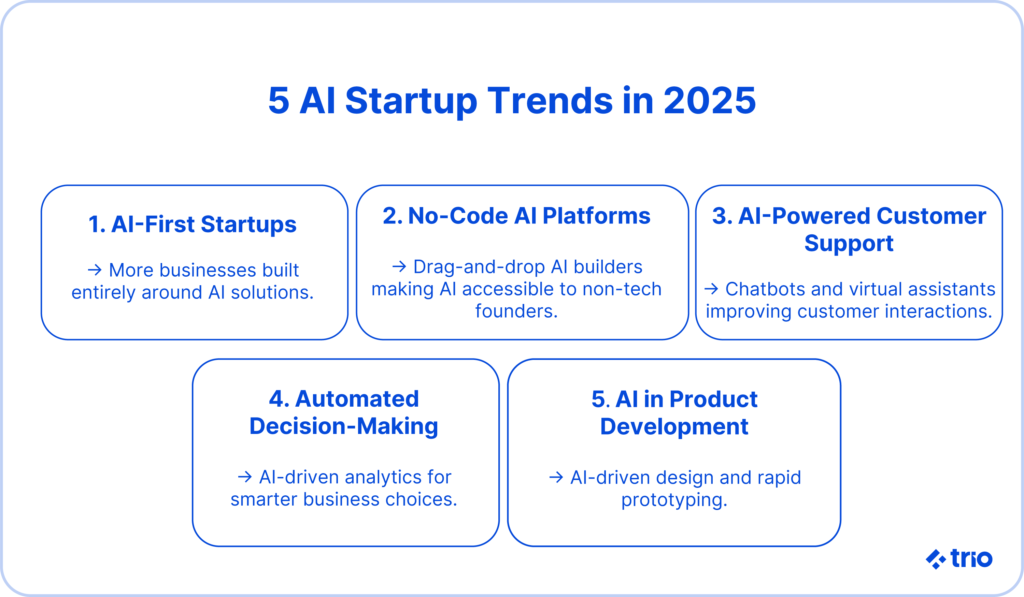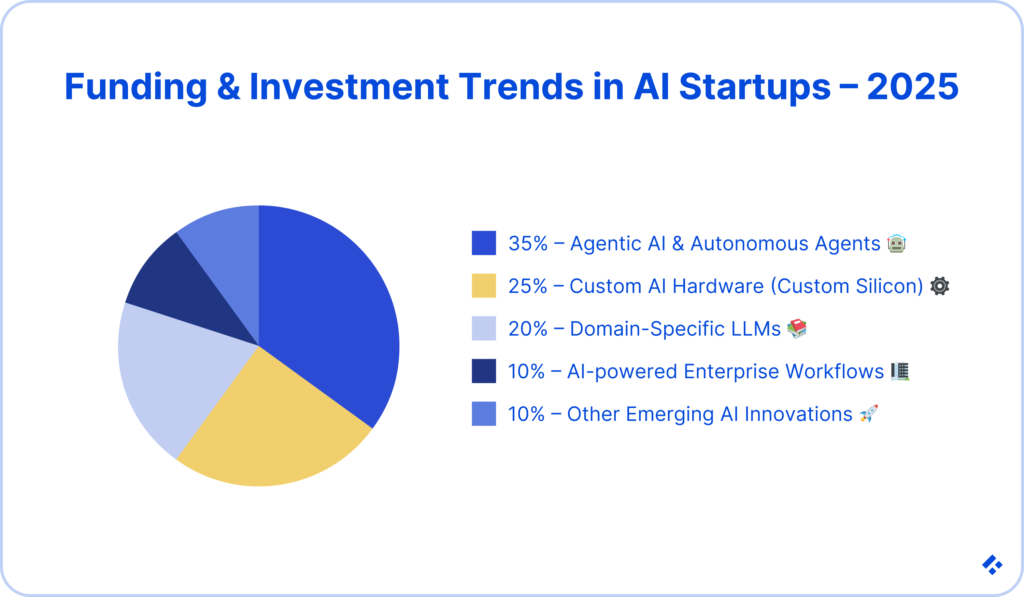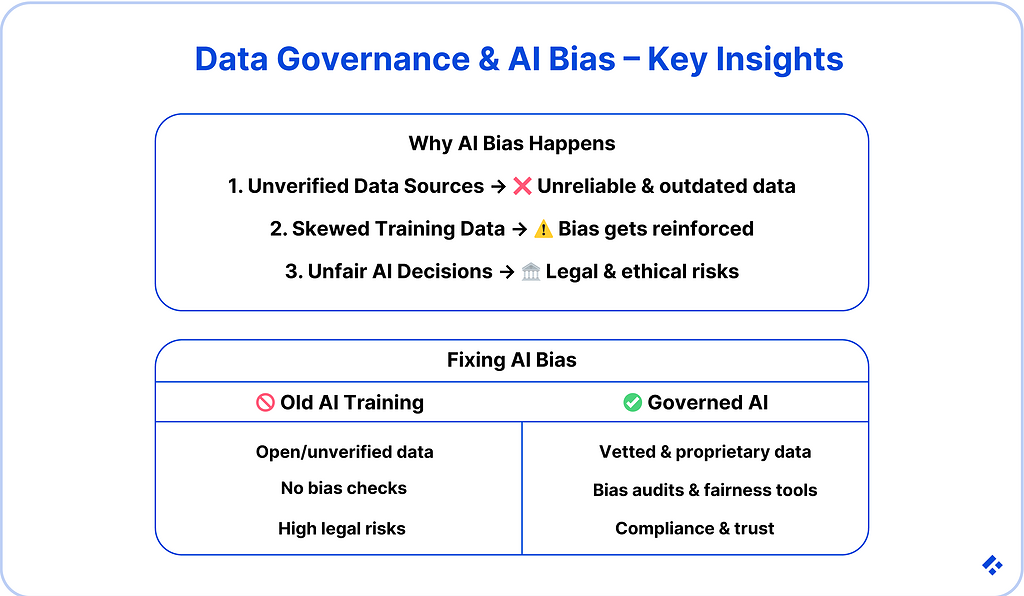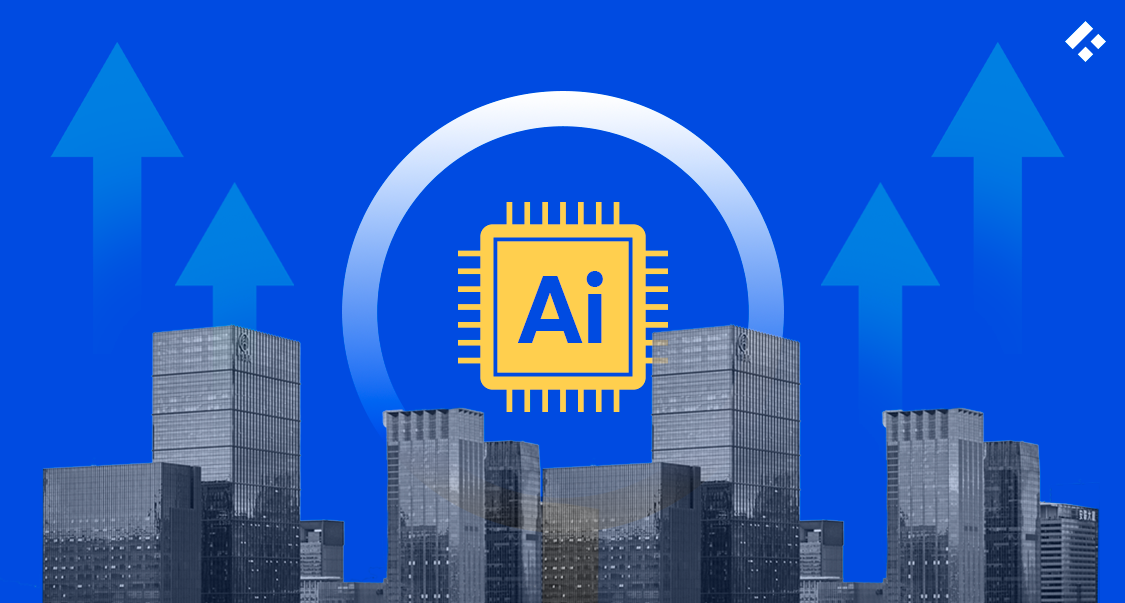Gone are the days when big corporations determined the future. Now, the flexibility and rapid decision-making processes of startups have become a massive boon, especially in the fast-developing world of AI and machine learning. AI tools are also playing a massive role in how startups scale, with automation providing a cost-effective boost to their scalability.
Let’s take a look at some of the top AI startup trends in 2026 so that you understand where there might be an opportunity to take advantage of AI development to fill market gaps or what tools your competitors are using to get ahead that you might be able to take advantage of, too!
At Trio, we aim to help companies with whatever their software requirements may be. Whether you are a small startup that needs help building and integrating new technology, a large enterprise that wants to use AI-powered tools alongside your legacy software, or even a non-tech company that needs to use AI and other tools but can’t create them yourself, you are in the right place.
Our staff augmentation and outsourcing models allow you to access highly skilled developers who are hand-picked for your fintech project without needing to commit to a permanent hire. This is one of the most effective ways to promote business growth through technology, regardless of your company’s size.
But before deciding if you need to develop new tools or need help making use of more technical tools, let’s look at the trends shaping the future of startups.

1. Generative AI Transforms Content, Code, and Creativity
Generative AI seemed to be what kicked off this AI craze. However, it may have been the first AI technology to be widely used by the public. Now, large language models can be used to write almost anything. Not only have many new AI companies been popping up, providing tools powered by these models, but they are also using them in their internal processes.
Startups can make use of generative AI platforms for everything from product design to media production. They can generate content for advertising, social media, and even other forms of customer support and engagement.
In particular, we have noticed that tools like OpenAI’s Sora and Runway’s Gen 2 have been popular for marketing purposes and have opened up the possibility of AI innovations that branch beyond basic text into complex fields like video.
Uizard, Jaspar, and many others are making use of these complex algorithms to transform product prototyping and marketing workflows.
We’ve also experienced, first-hand, the incredible possibilities of AI in code generation. Tools like Windsurf and Tabnine are letting developers work faster than ever before, automating processes that previously took up much of their time. This not only saves startups valuable money but also increases developer well-being.
2. Agentic AI Ushers in a New Era of Autonomous Systems
While chatbots and copilots were revolutionary in 2023 and 2024, AI agents seem to be the more recent focus. But how do they differ from their predecessors?
Instead of needing a prompt to get started, these advanced AI models can initiate, plan, and even complete tasks that require multiple steps. Human intervention is needed very minimally.
Cognosys and Adept are two startups at the forefront of this emerging market. They are integrating reasoning and long-horizon planning into AI systems. Other startups and enterprises are also experimenting with advanced agents, expanding into research, reporting, QA testing, and even financial forecasting. This could have a massive impact across industries.
Entire workflows might be replaced, especially in fields where turnaround time would be drastically increased.
3. Edge AI Brings Real-Time Intelligence to Devices
While most of the AI industry relies on cloud infrastructure, edge AI takes the opposite approach by deploying AI models on local hardware devices. Although IoT and 5G technology have a variety of use cases, some industries still want increasedcontrol and data privacy provided by these solutions.
Some examples of edge-based solutions we’ve encountered include those in fields like security, healthcare, and even manufacturing.
Luxonis and Edge Impulse are some of the biggest providers at the moment. They run models on lightweight, battery-efficient hardware that is ideal for robotics, surveillance systems, and potentially even wearables.
Concerns for data privacy are only growing. This, along with the fact that AI tools are used in more critical environments and companies are negatively affected if the tools cannot work in instances where they are offline, have low latency, or are bandwidth-constrained, means that edge AI isn’t likely to disappear any time soon.
Having an experienced developer on your team can provide you with useful insights, like the possible need for edge computing when you are expanding into new industries. This is one of the many reasons we recommend you get someone with niche expertise on your team. Their knowledge, along with team culture alignment, means you’ll be able to avoid many potential issues.
4. AI for Scientific Discovery & Healthcare
AI algorithms are proving to be invaluable in the world of scientific research, and startups are taking full advantage of this. AI helps analyze complex biological models that are impossible to figure out manually. Protein folding is just one example of this that has been critical in fields such as drug discovery.
Insitro, Recursion, and DeepMind all play a big part in drug discovery specifically, but many startups also play big roles in fields like diagnostics, utilizing AI for imaging, patient triage, and predictive analytics.
All of this proves to be incredibly useful in healthcare, where providers suffer from talent shortages and operational stress. Tech companies have the opportunity to create tools that not only take care of repetitive tasks that take up valuable time, but also improve the general quality of care provided.
5. AI Models That Reason: The Rise of Explainability
The future of AI is definitely reasoning. We’ve seen companies creating new solutions using large language models that are able to work through incredibly complicated tasks.
Anthropic and Cohere are two technology companies working on advancing current AI models. Some of the models these startups are working on can now reflect, critique, revise outputs, and much more. Usually, this is based on feedback loops.
However, the explainability of these models is very important for compliance, especially when they start to reason based on personal data or in fields that might have a combination of structured and unstructured data, like finance, law, and defense.
6. National Security Meets Artificial Intelligence
Speaking of defense, AI startups are becoming key players! We’re starting to get an idea of what the Cold War arms race might have felt like. Global tensions are definitely rising as governments all over the world try to take the lead in AI surveillance, simulation, and even cyber defense.
Some notable startups working closely with the US government include Shield AI and Anduril. However, there are many companies all over the world investing in AI defense and warfare. This includes everything from autonomous drones, which have already had a lot of action in the recent Russia-Ukraine war, to systems that make threat detection easier and more efficient.
We expect this trend to keep growing in the next few years, as more private startups are partnering with the private sector.
7. Shift to Verticalized AI Solutions
At the start, AI products were as broad as possible to allow users from a variety of fields to use some of the components or features they provided. However, keeping with the general tech industry trends we’re seeing, these one-size-fits-all solutions are no longer the way forward.
Instead, startups are creating tools that are, at the very least, niche or industry-specific. Many are even building tailored models for individual companies that are optimized for their workflows and their customer expectations. A good example of this is the Harvey, which targets the legal sector, and Hippocratic AI, which is tailored for healthcare.
This focused, more vertical approach means that you get the best solution possible and don’t have to pay for a bunch of features that you don’t end up using, but also that you can place more trust in the quality of your product since it was created with a combination of technical expertise and industry knowledge.
8. Automation-First Startups Lead in Cost Reduction
We’ve already discussed cost reduction briefly above, but automation in particular has had a major effect on a variety of different companies. This means startups are able to take advantage of demand.
Moveworks, UiPath, and AssemblyAI are all companies that provide powerful AI automation systems. These help companies automate time-consuming processes in support, HR, sales, and more, so that their employees can be used elsewhere.
The result of integrating AI automation solutions also allows companies to need fewer employees as they grow, leading to a particularly high ROI.
9. Custom AI Chips Disrupt Nvidia’s Dominance
We’ve depended on GPUs and CPUs for so long that anything else seems out of the question. But startups are now building AI chips that outperform typical chips at reduced cost.
Groq and Tenstorrent are two companies focused on building some of the fastest chips we’ve ever seen! And, they are quite energy efficient. Other companies are also focusing on designing in-house accelerators to power the use of AI, like LLMs.
This new technology is creating ripples across the entire industry, from the way that funding is focused to the different deployment strategies.
10. AI-Generated Products Power Consumer and Enterprise Use
We’ve covered the basics of generative AI, but not all of how they are starting to power consumer and enterprise use. Music and video product mockups and presentations are just scraping the surface of how AI products are being used in workflows.
Suno, PhotoRoom, and Tome are all focused on different forms of product creation using AI. Often, these products, or some versions of them, end up directly in consumers’ laps.
In terms of enterprises, iteration can be greatly sped up, so employees can focus more on the final creative decisions.
The Fastest Growing AI Startups in 2026
There are a bunch of fast-growing AI startups that play a role in shaping the future. It would be almost impossible to mention all of them, but some you can start observing include:
- Cohere: Focused on customizable enterprise LLMs.
- Perplexity AI: Using AI to improve search technology.
- Codeium: Building GitHub-integrated AI coding assistants that can help build new applications.
- Synthesia: One of many companies trying to improve AI video generation.
- Frame AI: Providing companies with AI to help in customer analysis.
- Databricks: A data intelligence platform.
Funding, M&A, and Investment Trends in AI Startups
The venture capital environment has been crazy the last few years, especially when it comes to AI startups. While this has calmed a fair bit recently, there are still many different investment opportunities if your company has a clear value proposition.
Investors want to put their money into companies with strong technical teams and clear direction. This direction could be in anything. Some examples we’ve seen in the last few years include proprietary data, infrastructure-level innovation, or deep integrations with enterprise workflows.
These trends have shaped our own business, as our developers focus on staying at the forefront of the industry, leading them to specialize in using blockchain technology, integrating tech in difficult situations – including alongside legacy software – and creating tools that promote innovation within companies.
Growth-stage funding seems to be more popular with agentic AI, custom silicon, or domain-specific LLMs. In other words, it’s keeping with the trends we discussed.
If you want to attract investors, it is important that you can show traction. One great way to get started is to get experts on board to advise you and help with practical development, like actual coding. Staff augmentation is a good way to do this on a limited budget.

Regional Growth: Where AI Startups Are Thriving
Silicon Valley is definitely the place we think of when we picture new developments in the tech field. But this is not the only place developers are flocking to promote the rise of AI.
In North America, big cities like New York, Toronto, and even Austin are flourishing. In Europe, where public funding works a little differently, research institutions in France, the UK, and Germany are all trying to look at the future and contribute in meaningful ways. Of course, we can’t forget places like China, which has made headlines recently with cost-effective LLMs.
As always, India and LATAM have a very strong developer base. Some of the big AI trends shaping businesses in these countries include developer-focused tools and B2B AI solutions.
Challenges Facing AI Startups in 2026
While companies are building incredible tools that are paving the way forward, success isn’t always guaranteed. In fact, these AI companies need to overcome a variety of different hurdles that other people in the tech industry might have to face.
Regulation, Ethics, and the EU AI Act
The EU AI Act is now in full swing. Now, startups need to worry about risk classification, documentation, and auditability from day one.
This is in keeping with a global focus on transparency and data security, as well as the preservation of human oversight.
While being careful is a good thing and builds the trust of their users, it can slow down development a good deal.
Data Governance and Bias in AI Models

Startups used to be able to use open data or scrape data from other places, but that is now looked down on. Data lineage, representational fairness, and intellectual property are now important considerations.
Investors and customers have realized that their own data might be at risk, making them more aware. Furthermore, it’s become clearer as time has passed that AI models can also be biased, especially if they have not been trained correctly.
Fortunately, there are now several tools on the market to help audit and clean training data. Improving these tools could also be an opportunity for many startups involved in the AI field.
If you have an idea, but don’t have the technically skilled developers on your team, you are in the right place. Here at Trio, we focus on hiring only the top 1% of all applicants. This means we hire developers at the forefront of the industry, and can give you access to them within a couple of days or weeks, allowing you to avoid a lengthy hiring and onboarding process.
If you want to find out more about our AI and automation developers, reach out to us to schedule a free consultation.





